The Myth of the ‘Low Functioning’ Child
Why Labels Hurt More Than They Help in Autism Support
“He’s low functioning.”
“She can’t talk, so there’s not much going on.”
“He’ll never live a normal life.”
These phrases echo through clinics, classrooms, and even homes whispered with sadness or stated with finality. But what if I told you that the idea of a “low functioning” child is not only inaccurate, but incredibly harmful?
As a practitioner of Spelling to Communicate (S2C) and a special needs educator, I have had the honour of working with dozens of autistic children many of whom had been labeled as “low functioning” simply because they are nonspeaking or struggle with motor control. And yet, these same children have written poetry, expressed deep emotions, questioned God, debated politics, and shared powerful insights about their world.
So let’s talk about the myth of the “low functioning” child.
💭 Where Did the Label Come From?
The terms “high functioning” and “low functioning” originated as a quick way to describe how much support an autistic person might need. Over time, they’ve been twisted into judgments about intelligence, potential, and worth.
-
“High functioning” is often used for people who can speak or mask their autism.
-
“Low functioning” is thrown at those who need more visible support or don’t use spoken language.
But these labels don’t reflect what’s going on inside.
Imagine being trapped in a body that won’t cooperate. Your hands won’t point, your mouth won’t speak, your legs kick when you don’t want them to. And all the while, people treat you like you don’t understand — when in reality, you’re absorbing every word, every tone, every glance.
🚫 Why the Label is Dangerous
1. It limits expectations.
Once a child is labeled “low functioning,” people often stop expecting anything more. They don’t offer rich education. They avoid communication tools. They assume the child doesn’t understand — and never will.
2. It ignores hidden intelligence.
Just because someone can’t speak doesn’t mean they can’t think. Many of my nonspeaking students are brilliant — they just need support to express it.
3. It causes emotional harm.
Imagine growing up hearing people talk about you like you’re broken or “less than.” It erodes confidence and contributes to depression and anxiety in children and their families.
🧠 What’s Really Going On?
Many nonspeaking autistic individuals have motor planning difficulties not intellectual disabilities. This means the brain knows what it wants to do or say, but the body struggles to carry it out. It’s like being locked in, watching the world assume you’re not there.
S2C and other augmentative communication methods open the door to what was previously hidden. Time and time again, we discover that these so-called “low functioning” children are vibrant, intelligent, emotionally aware human beings often more in tune with the world than we are.
🌱 Let’s Shift the Language
Instead of saying:
-
“Low functioning”
Say: -
“Someone who needs more support to communicate”
-
“Someone who uses different methods to express themselves”
-
“Someone who hasn’t found their voice yet”
Let’s drop the function labels altogether and focus on support needs, strengths, and potential.
✨ Presume Competence. Always.

Presuming competence means assuming an autistic individual has the capacity to think, learn, and understand—even if you don’t see any tangible evidence that this is the case.
Every time we meet a child — regardless of how they present — we must assume they understand. We must offer rich language, opportunities to learn, and a chance to express themselves.
Because here’s the truth:
There’s no such thing as a “low functioning child.”
Only a misunderstood one.
🖊️ Final Thoughts
If you’re a parent, teacher, therapist, or loved one of an autistic child, I challenge you today:
Remove the labels. Believe in more. Give access. Support expression.
You might be shocked by what they have to say.

Comments
Post a Comment